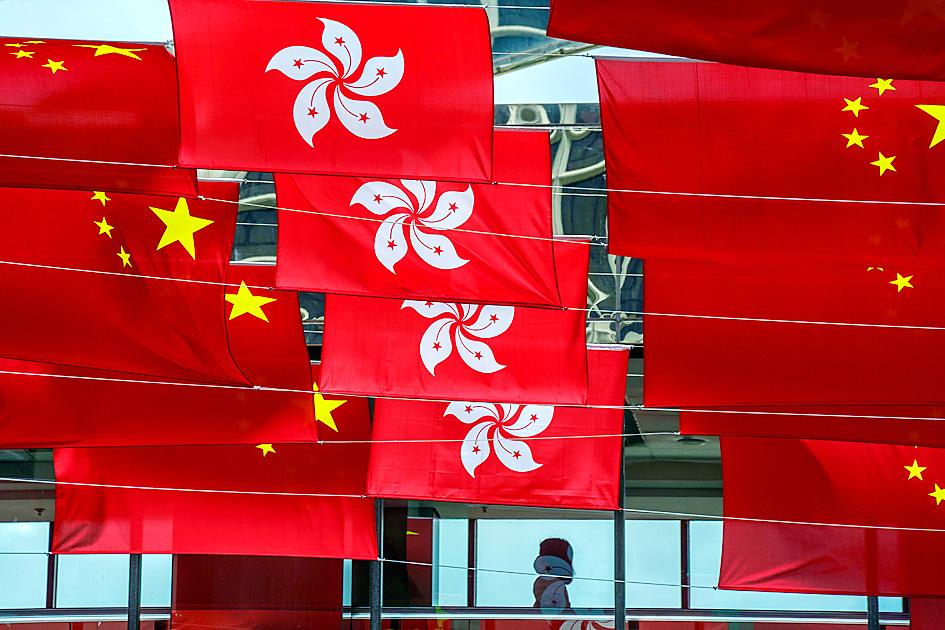Beijing appears to be using Hong Kong’s National Security Law to target “foreign forces,” and is continuing to change the territory’s governance and institutions to reflect those of mainland China, the Mainland Affairs Council’s (MAC) latest quarterly report said.
China is continuing to undermine Hong Kong’s autonomy and is beginning to target foreign organizations that operate in the territory, using the law Beijing imposed on Hong Kong nearly two years ago, the report said.
Citing an example, the report said that British nonprofit Hong Kong Watch was on March 4 approached by officials from Hong Kong’s National Security Department to remove content from its Web site that the department said contravened the national security legislation.

Photo: Bloomberg
It was the first report of a foreign organization targeted with the law, the report said.
Suppression of individual rights and freedoms accelerated in January with the first convictions in Hong Kong for publications contravening the law, it said.
In March, former Hong Kong Bar Association chairman Paul Harris left the territory after security officials warned him that he was allegedly in contravention of the law, the report said.
Although Hong Kong participates in international organizations separate from China, it supports the Chinese Communist Party’s (CCP) political goals, such as blocking Taiwan’s “meaningful participation in the WTO,” it said.
By demonstrating its need to act on behalf of the CCP, Hong Kong is showing that its ability to meaningfully participate independently in international organizations is weakening, it added.
The report also cited Hong Kong government data as showing that the number of mainland Chinese and foreign companies registered in the territory is increasing, despite overseas companies leaving — indicating that Chinese investment in Hong Kong is growing.
Last year, 9,049 foreign and Chinese companies were registered in Hong Kong, compared with 9,025 companies the previous year.

INVESTIGATION: The case is the latest instance of a DPP figure being implicated in an espionage network accused of allegedly leaking information to Chinese intelligence Democratic Progressive Party (DPP) member Ho Jen-chieh (何仁傑) was detained and held incommunicado yesterday on suspicion of spying for China during his tenure as assistant to then-minister of foreign affairs Joseph Wu (吳釗燮). The Taipei District Prosecutors’ Office said Ho was implicated during its investigation into alleged spying activities by former Presidential Office consultant Wu Shang-yu (吳尚雨). Prosecutors said there is reason to believe Ho breached the National Security Act (國家安全法) by leaking classified Ministry of Foreign Affairs information to Chinese intelligence. Following interrogation, prosecutors petitioned the Taipei District Court to detain Ho, citing concerns over potential collusion or tampering of evidence. The

NEGOTIATIONS: Taiwan has good relations with Washington and the outlook for the negotiations looks promising, Minister of Economic Affairs J.W. Kuo said Taiwan’s GDP growth this year is expected to decrease by 0.43 to 1.61 percentage points due to the effects of US tariffs, National Development Council (NDC) Minister Paul Liu (劉鏡清) said at a meeting of the legislature’s Economics Committee in Taipei yesterday, citing a preliminary estimate by a private research institution. Taiwan’s economy would be significantly affected by the 32 percent “reciprocal” tariffs slapped by the US, which took effect yesterday, Liu said, adding that GDP growth could fall below 3 percent and potentially even dip below 2 percent to 1.53 percent this year. The council has commissioned another institution

NEGOTIATIONS: The US response to the countermeasures and plans Taiwan presented has been positive, including boosting procurement and investment, the president said Taiwan is included in the first group for trade negotiations with the US, President William Lai (賴清德) said yesterday, as he seeks to shield Taiwanese exporters from a 32 percent tariff. In Washington, US Trade Representative Jamieson Greer said in an interview on Fox News on Thursday that he would speak to his Taiwanese and Israeli counterparts yesterday about tariffs after holding a long discussion with the Vietnamese earlier. US President Donald Trump on Wednesday postponed punishing levies on multiple trade partners, including Taiwan, for three months after trillions of US dollars were wiped off global markets. He has maintained a 10 percent

TRADE: The premier pledged safeguards on ‘Made in Taiwan’ labeling, anti-dumping measures and stricter export controls to strengthen its position in trade talks Products labeled “made in Taiwan” must be genuinely made in Taiwan, Premier Cho Jung-tai (卓榮泰) said yesterday, vowing to enforce strict safeguards against “origin laundering” and initiate anti-dumping investigations to prevent China dumping its products in Taiwan. Cho made the remarks in a discussion session with representatives from industries in Kaohsiung. In response to the US government’s recent announcement of “reciprocal” tariffs on its trading partners, President William Lai (賴清德) and Cho last week began a series of consultations with industry leaders nationwide to gather feedback and address concerns. Taiwanese and US officials held a videoconference on Friday evening to discuss the